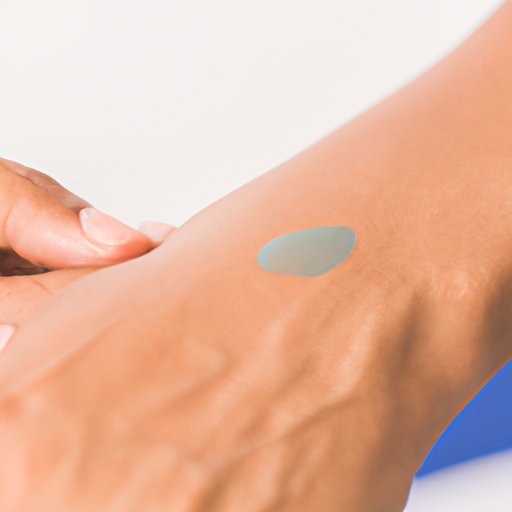Introduction
If you’ve recently gotten a new tattoo, you may be experiencing a common phenomenon: itching. While most people know that tattoos involve some level of pain, few realize that itching is also a common occurrence during the healing process.
In this article, we’ll explain the science behind tattoo itching, explore the reasons why tattoos sometimes itch, and provide practical tips for minimizing the discomfort of your new ink.
The Science Behind It: Why Tattoos Sometimes Itch and How to Treat It
At its most basic level, tattoo itching is simply a normal part of the body’s healing process. When the needle penetrates the skin, it causes a mild injury that triggers the immune system to come to the site of the wound. This results in inflammation and the release of histamine, a chemical that can make the skin itch.
In addition to histamine, other factors can contribute to tattoo itching. For example, some people may experience an allergic reaction to the tattoo ink or the substances used during the tattooing process. Others may develop an infection, which can cause itching, redness, and swelling.
If you’re experiencing tattoo itching, there are a few things you can do to alleviate the discomfort. For starters, try not to scratch the area, as this can exacerbate the problem and increase the risk of infection. Instead, try applying a cold pack or a non-fragranced, unscented moisturizer to the area to soothe the skin.
Is It Normal for a Tattoo to Itch? Understanding the Causes and Solutions
While a certain amount of tattoo itching is normal, it’s important to understand the difference between normal and abnormal itching. Normal itching will typically last for a few days to a week, depending on the size and location of the tattoo, and can be managed with home remedies.
In some cases, however, tattoo itching can be a sign of a more serious problem. If you notice that your tattoo is getting increasingly itchy, or if it becomes red, swollen, or hot to the touch, you may have an infection and should seek medical attention right away.
Soothing the Itch: Tips and Tricks for Relieving the Discomfort of Your New Tattoo
If your tattoo is itching and you’re looking for some relief, there are several steps you can take to minimize the discomfort. For starters, try wearing loose, comfortable clothing that won’t rub against the tattoo. This will help prevent further irritation and itching.
You can also try applying a cool compress to the area, or taking a lukewarm bath to soothe the skin. Some people find that topical creams or ointments can help relieve itching, though it’s important to choose a product that’s specifically designed for tattoos and doesn’t contain any harsh chemicals.
If you’re looking for a more natural solution, try applying aloe vera gel or coconut oil to the area. These natural remedies can help soothe the skin and reduce itching without any harmful side effects.
When the Healing Process Goes Awry: Common Issues That Cause Tattoo Itching
In some cases, tattoo itching can be a sign of a more serious problem. For example, an allergic reaction to the tattoo ink or to one of the substances used during the tattooing process can cause intense itching, as well as redness, swelling, and other symptoms.
Infections are another common cause of tattoo itching. If you notice that your tattoo is getting increasingly itchy, or if it starts to feel hot to the touch, you may have an infection and should seek medical attention right away.
Protecting Your Ink: Preventing Itchy Tattoos through Proper Aftercare
Preventing tattoo itching starts with proper aftercare. In order to ensure that your tattoo heals properly, it’s important to follow a few simple steps after the tattooing process is complete.
First, keep the area clean and dry, and avoid exposing it to direct sunlight or soaking it in water for at least the first few days. You should also avoid wearing tight clothing or engaging in activities that could rub against the tattoo and cause irritation, such as sports or heavy lifting.
If you notice any signs of infection, such as redness, swelling, or a fever, seek medical attention right away. With proper aftercare, your tattoo should heal properly and without any excessive itching.
Conclusion
If you’re experiencing tattoo itching, don’t panic. It’s a common part of the healing process, and can usually be managed with simple home remedies. However, if you notice any signs of infection or other serious symptoms, don’t hesitate to seek medical attention right away.
With proper aftercare and a little patience, you can ensure that your tattoo heals properly and looks great for years to come.
